US airline stock valuations stuck on runway despite travel boom

A woman checks the arrivals and departures board at Chicago Midway International Airport in Chicago, Illinois, U.S. April 18, 2023. REUTERS/Jim Vondruska/File photo
CHICAGO -Relentless travel demand has sent bookings at U.S. carriers soaring, translating into bumper earnings. However, their shares have not shown the same trajectory as questions linger about the sustainability of consumer spending.
Airline shares have suffered because of bearish sentiment about the broader economy as interest rates are up sharply and inflation remains high, analysts said. That’s even though consumers have shifted their spending to leisure activities like travel.
US Global Jets ETF, an exchange-traded fund that includes airlines and is seen as a proxy for the industry, is down about 30 percent from pre-pandemic levels even as passenger traffic has hit record highs. In the same timeframe, S&P 500 has gained about 31 percent.
Even after a rally in airline stocks so far this year, shares of United Airlines and Delta Air Lines still trade at 5.2 and 7 times forward profit estimates, respectively. That’s well below the S&P 500’s 19.1 multiple and below the industry’s average of 8.27, according to Refinitiv Eikon figures.
“It is hard for airlines to decouple from the macro trade,” Jefferies analyst Sheila Kahyaoglu said.
Airlines will again have an opportunity to sell their story when they report earnings starting this week.
Delta, which reports second-quarter results Thursday, expects profits to nearly double this year, but its shares are still down 21 percent from 2019 highs. United has forecast a four-fold jump in earnings this year, but its shares are down about 40 percent from pre-pandemic levels.
The number of doubters is up as short interest in airline shares is at 4.9 percent, compared with little over 3% before the pandemic, TD Cowen data shows.
“Everyone is so bearish, but airlines themselves are doing exceptionally well,” said Frank Holmes, CEO at U.S. Global Investors, which owns airline stocks.
The number of passengers moving through airport checkpoints has been averaging above pre-pandemic levels since mid-May and hit a four-year high last month, U.S. Transportation Security Administration data showed.
Strong demand has bolstered airfares, allowing carriers to offset higher costs. Airlines have generated 33 percent more in sales in the first five months of 2023 versus 2022, Airlines Reporting Corp (ARC) data shows.
There are still no signs of air travel demand waning as ticket purchases for the rest of 2023 are up 4 percent, said Steve Solomon, ARC’s chief commercial officer.
Ticket prices have eased on improved supplies and a decline in oil prices. U.S. inflation data released on Wednesday shows airline fares fell by a seasonally adjusted 8.1 percent in June from a month earlier, the third straight monthly decline. Year-over-year, fares were down 18.9 percent, the largest annual drop since February 2021.
Average domestic round-trip airfare in July is $280, down about 11 percent from last year, according to online travel agency Hopper. For trips to Europe, round-trip fare is $897, down 0.8 percent.
Hayley Berg, Hopper’s lead economist, said airfares are following a seasonal pattern where they tend to peak in June, but prices are not plummeting.
With high interest rates and rising living costs stretching household budgets, airlines face questions about demand.
Carriers typically rely on big-spending corporate customers to fill high-margin seats after the summer travel season, but recovery in corporate travel remains sluggish.
Airlines have said the shift in consumer spending away from goods and into services will continue to fuel demand. Constrained capacity due to shortages of aircraft, spare parts and labor is expected to continue underpinning airlines’ pricing power.
Believers in airline stocks have seen signs of hope this year.
In June, the S&P 1500 airlines index posted its strongest monthly gain since 2021, outperforming the S&P 500. After hitting a six-month low in March, cheap valuations along with cooling oil prices sparked a rally in airline stocks, as shares of Delta, United and American Airlines have risen more than 45 percent this year, analysts said.
Global Investors’ Holmes said airline shares are poised for even more gains. “There’s more upside to the downside.”